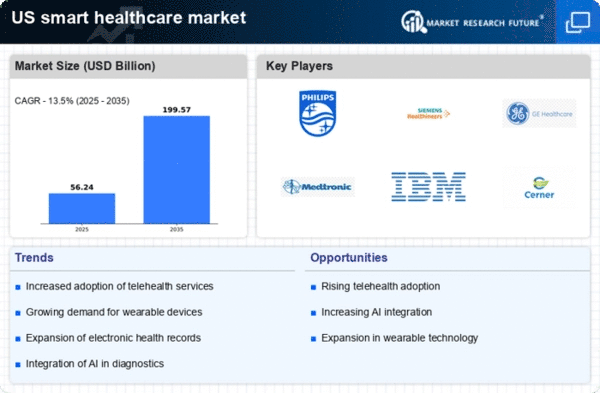Growing Aging Population
The smart healthcare market is poised for growth due to the increasing aging population in the US, which is projected to reach 73 million by 2030. This demographic shift presents unique challenges in healthcare delivery, as older adults often require more frequent medical attention and management of chronic conditions. Smart healthcare solutions, such as remote monitoring and telehealth services, are particularly well-suited to address these needs, allowing for continuous care and reducing the burden on healthcare facilities. The demand for age-friendly technologies is expected to drive market growth, as healthcare providers seek to enhance the quality of life for elderly patients. Consequently, the aging population is likely to be a key driver in the expansion of the smart healthcare market.
Government Initiatives and Funding
The smart healthcare market is significantly influenced by government initiatives and funding aimed at enhancing healthcare delivery. Various federal programs are designed to promote the adoption of health information technology and telehealth services. For example, the Centers for Medicare & Medicaid Services (CMS) has implemented policies that incentivize the use of electronic health records and telemedicine. In 2025, federal funding for health IT is projected to exceed $10 billion, reflecting a commitment to modernizing healthcare infrastructure. These initiatives not only facilitate the integration of smart technologies but also encourage healthcare providers to innovate and improve patient care. As a result, government support is likely to play a crucial role in the growth of the smart healthcare market.
Increased Focus on Preventive Healthcare
The smart healthcare market is benefiting from an increased focus on preventive healthcare, as stakeholders recognize the importance of early intervention in managing health conditions. This shift is supported by the growing prevalence of chronic diseases, which account for approximately 75% of healthcare spending in the US. By utilizing smart technologies such as wearable devices and mobile health applications, individuals can monitor their health metrics and receive timely alerts for potential health issues. This proactive approach not only reduces healthcare costs but also fosters a culture of wellness. Consequently, the emphasis on preventive care is likely to drive the expansion of the smart healthcare market, as more consumers and providers adopt these innovative solutions.
Technological Advancements in Medical Devices
The smart healthcare market is experiencing a surge due to rapid technological advancements in medical devices. Innovations such as remote monitoring systems, smart diagnostic tools, and AI-driven applications are transforming patient care. For instance, the integration of IoT in medical devices allows for real-time data collection and analysis, enhancing decision-making processes. The market for connected medical devices is projected to reach approximately $50 billion by 2026, indicating a robust growth trajectory. These advancements not only improve patient outcomes but also streamline healthcare operations, making them more efficient. As healthcare providers increasingly adopt these technologies, the smart healthcare market is likely to expand significantly, driven by the demand for improved patient management and operational efficiency.
Rising Demand for Personalized Healthcare Solutions
The smart healthcare market is witnessing a growing demand for personalized healthcare solutions, which cater to individual patient needs. This trend is largely driven by advancements in genomics and biotechnology, enabling tailored treatment plans based on genetic profiles. According to recent estimates, the personalized medicine market is expected to reach $2 trillion by 2030, reflecting a substantial shift towards individualized care. As patients seek more customized healthcare experiences, providers are increasingly leveraging smart technologies to deliver targeted therapies and interventions. This shift not only enhances patient satisfaction but also improves health outcomes, thereby propelling the growth of the smart healthcare market.
















